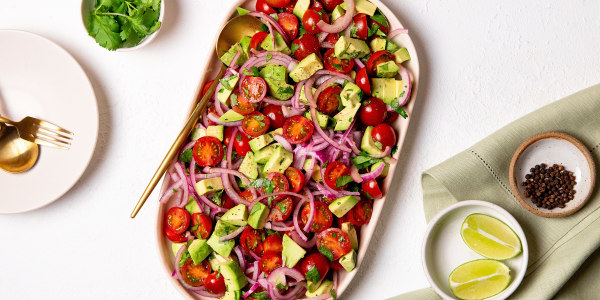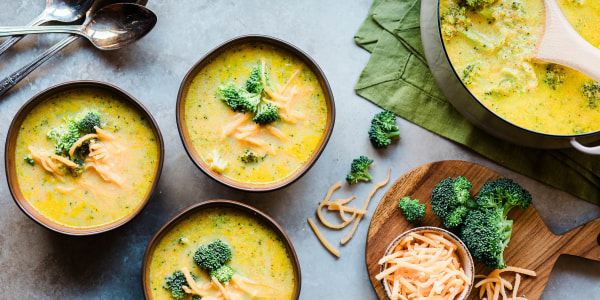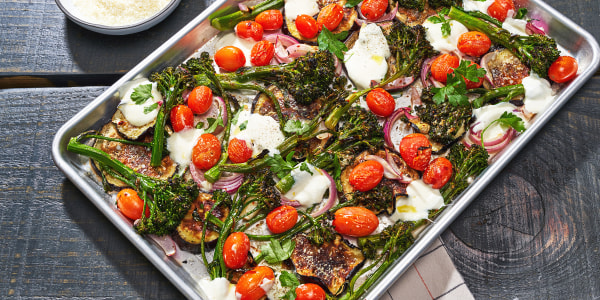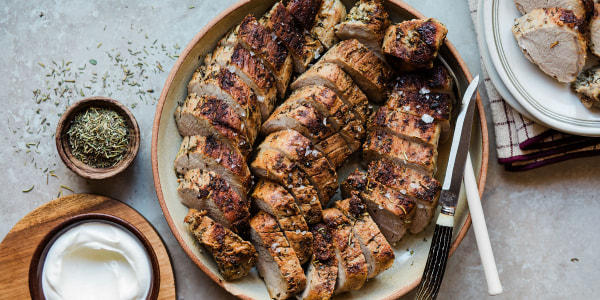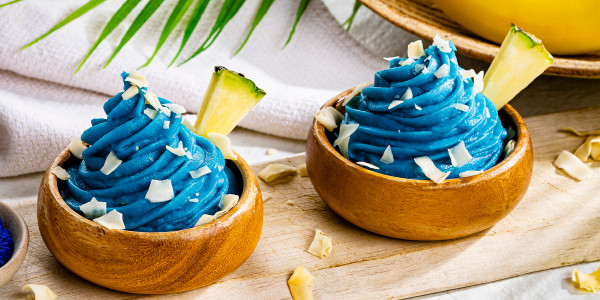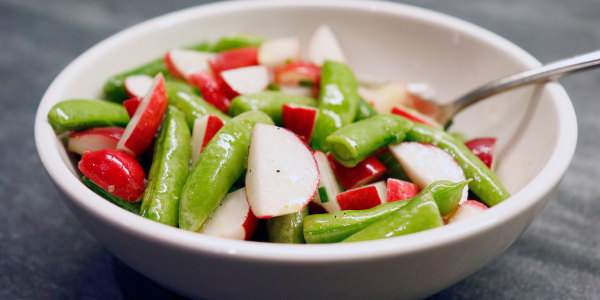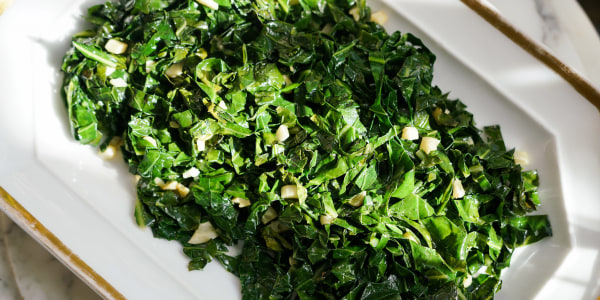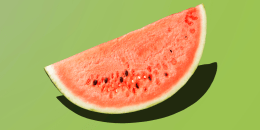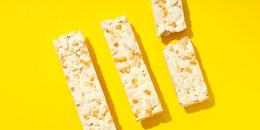Although it can be difficult to maintain long term, we know that low-carb diets can help you lose weight. And there are plenty of low-carb foods that can offer health benefits, regardless of whether they're all you choose to eat.
Even if a low-carb diet isn’t for you, keeping these highly nutritious and delicious foods stocked in your house for meals and snacks can help you look and feel better.
Many high-carb foods are ultra-processed so steering clear can reduce your risk of health complications long term. But low-carb foods usually contain a lot of fiber, which is good for gut health. Low-carb vegetables are especially nutritious, thanks to their high vitamin content. Healthy fats are also common in low-carb foods — and good for the heart, cholesterol and inflammation.
Asparagus
This delicious and nutrient-rich vegetable has about 4 grams of carbs per cup. It’s known for its tender, unique and slightly sweet flavor. Asparagus is also high in vitamins A, C, E and K, making it a fantastic addition to salads, stir-fries or simply roasted as a side dish.
Pickles
Pickles are low in carbohydrates, though it’s essential to check for added sugars in some brands. They can provide a tangy flavor to salads, sandwiches or burgers. Rich in probiotics when fermented, pickles can also support gut health and add a satisfying crunch to your meals.
Cauliflower
At roughly 5 grams of carbohydrates per cup, this cruciferous vegetable can be enjoyed in various forms, such as cauliflower rice, mashed cauliflower or even as a pizza crust alternative. It’s rich in vitamins C and K and can be a great low-carb substitute for many high-carb foods.
Beef jerky
Beef jerky is typically low in carbohydrates, though it’s important to check for added sugars. It offers a satisfying option for those looking to boost their protein intake while keeping carbs in check, but its high fat content means it should be considered a treat.
Mushrooms
A low-carb delight containing about 2 grams of carbohydrates per cup, these fungi are not only low in calories but are also rich in umami flavor, making them perfect for enhancing soups, stir-fries, and salads. They provide a good source of B vitamins and minerals, such as selenium, contributing to overall health.
Egg salad
This delicious mixture of hard-boiled eggs and mayonnaise is a low-carb and filling option for meals or snacks. Packed with protein and healthy fats, it can be served on its own, in lettuce wraps or as a spread on low-carb bread. Its creamy texture and rich flavor make it a satisfying choice for those looking to maintain a low-carb diet.
Artichokes
Artichokes are unique vegetables that contain approximately 14 grams of carbohydrates per medium artichoke, with a significant amount of fiber. They are known for their distinctive flavor and are often enjoyed steamed or roasted. Artichokes are packed with antioxidants, vitamins C and K, and can be a delightful addition to dips, salads or as a stand-alone dish.
Radicchio
If you're not familiar with radicchio, it's a chicory vegetable that adds a bold, bitter flavor to dishes and contains around 4 grams of carbohydrates per cup. Its vibrant red and white leaves can be used in salads, grilled or roasted, adding a touch of color and a unique taste. Radicchio is also high in antioxidants and vitamins, making it both a flavorful and healthful choice.
Chicken wings
Chicken wings contain no carbohydrates when they are baked or fried without breading or sauce. They are rich in protein and can be flavored with a variety of seasonings, or you can choose a low-carb sauce.
Arugula
This peppery salad green contains less than 1 gram of carbohydrates per cup. Its distinct flavor makes it a popular choice for salads, sandwiches and as a topping for pizzas. Arugula is rich in vitamins A, C and K, and its low calorie count makes it an excellent addition to a variety of dishes without adding significant carbs.
Sardines
Sardines are small fish that contain zero carbohydrates while being rich in omega-3 fatty acids and protein. They are a convenient and nutritious option, often available canned, making them easy to incorporate into salads, pasta dishes, or enjoy straight from the can. Sardines are a powerhouse of nutrients, supporting heart health and providing essential fatty acids.
Cabbage
At about 5 grams of carbohydrates per cup, this versatile vegetable can be used in salads, stir-fries or even fermented into sauerkraut. It is low in calories and high in vitamins C and K, along with fiber, making it a healthy option that can help promote digestive health.
Zucchini noodles
Zucchini noodles, or “zoodles,” are an excellent low-carb alternative to traditional pasta, containing very few carbohydrates. They are made by spiralizing fresh zucchini, creating a light and nutritious base for various sauces and toppings. Zucchini noodles are not only low in calories but also high in vitamins A and C, making them a healthy addition to any meal.
Almonds and almond flour
Almonds contain about 6 grams of carbohydrates per ounce (approximately 23 almonds), with around 3.5 grams of fiber, resulting in about 2.5 grams of net carbs. Almond flour is derived from ground almonds and low in carbs, making it a fantastic substitute for regular flour in baking. Both almonds and almond flour are versatile ingredients that provide healthy fats, protein and a satisfying crunch to various dishes.
Bacon
This beloved ingredient contains zero carbohydrates, making it a staple for low-carb diets. Known for its rich flavor and crispy texture, bacon adds both protein and a savory depth to a variety of dishes, from breakfast meals to salads and casseroles. Its high-fat content makes it a satisfying choice but also means it should be eaten in moderation.
Celery
Known for its high water content, celery is a great low-calorie snack with a serious crunch. It can add a dash of freshness to your recipes. Use it in soups and as a dipper for spreads. It’s also a good source of vitamins K and C.
Chard
This nutritious leafy green contains about 3 grams of carbohydrates per cup. Known for its vibrant, colorful stalks and dark green leaves, chard is rich in vitamins and has beneficial antioxidants. It can be sautéed, steamed or added to soups, providing a flavorful and healthful boost to a variety of dishes.
Strawberries
Strawberries are relatively low in carbohydrates compared to many other fruits. A typical serving of strawberries (about 100 grams or roughly 3.5 ounces) contains approximately 7-8 grams of carbohydrates, with about 2 grams of that being fiber.
Coconut cream
Coconut cream is a rich and decadent ingredient that is low in carbohydrates and high in healthy fats. It is often used in desserts, smoothies and curries, adding a creamy texture and exotic flavor. Packed with medium-chain triglycerides (MCTs), coconut cream can provide a quick source of energy and is a great option for those following a ketogenic or low-carb diet. However, coconut cream is high in saturated fat, so you want to use it sparingly.
Soy sauce
This flavorful condiment that is low in carbohydrates, making it a great addition to a variety of dishes. Known for its rich umami flavor, it enhances the taste of stir-fries, marinades and dipping sauces. With its savory profile, soy sauce is a versatile ingredient that can elevate the flavors of both meat and vegetable dishes without adding significant carbs.
Cucumber
Cucumbers are a refreshing vegetable that contains about 4 grams of carbohydrates per cup. Their high water content makes them hydrating and low in calories — an excellent addition to salads, sandwiches or enjoyed as a crunchy snack. With their mild flavor and crisp texture, cucumbers add a light and refreshing element to any meal.
Flaxseeds
Flaxseeds contain about 3 grams of carbohydrates per tablespoon, and they are high in fiber, making them a nutritious addition to your diet. These tiny seeds are rich in omega-3 fatty acids and can be easily incorporated into smoothies, yogurt or baked goods. Their fiber content not only supports digestive health but also helps to keep you feeling full and satisfied.
Chia seeds
Chia seeds contain about 12 grams of carbohydrates per ounce, but they are also high in fiber, which lowers the net carbs to around 1 gram. These tiny seeds can absorb liquid and expand, making them an excellent thickening agent for puddings, smoothies and baked goods. Packed with nutrients, chia seeds are a great source of omega-3 fatty acids, antioxidants and protein.
Carrots
Carrots contain approximately 9 grams of carbohydrates per medium carrot (about 61 grams), with about 3 grams of sugar and 2 grams of fiber, resulting in roughly 7 grams of net carbs. Known for their sweet flavor and crunchy texture, carrots can be enjoyed raw, roasted or added to soups and salads. They are rich in vitamins A and K, making them a nutritious choice for those looking to incorporate more vegetables into their diet.
Avocado
A whole avocado has about 15 grams of carbs, but you're unlikely to eat the entire thing in one sitting, so it's more realistic that you'll get 4-5 carbs in one meal or snack. It's also high in monounsaturated, aka healthy fats, which can improve cholesterol levels and reduce belly fat. A great way to eat an avocado is to mix it with something high in fiber, such as humus or whole-grain bread, or eat it on top of an apple — I promise it's delicious!
Seaweed
Seaweed is a nutrient-dense food that is low in carbohydrates and high in essential minerals, making it a fantastic addition to salads or enjoyed as a snack. It is rich in iodine, calcium, and vitamins A and C, offering numerous health benefits. Seaweed can be used in various dishes, such as sushi or miso soup, and is increasingly popular among health-conscious individuals.
Pork rinds
A crunchy snack alternative that contains zero carbohydrates, pork rinds can be a treat for those trying to maintain a low-carb lifestyle. They are high in protein but also in fat, so should be eaten rarely.
Broccoli
Broccoli is considered a cruciferous vegetable, along with cauliflower, Brussels sprouts, kale and arugula. This type of food is high in glucosinolate, which research shows may reduce risk of cancer.
There are 30 calories in one cup of broccoli, 6 grams of carbs and 3 grams of fiber. My go-to way to cook broccoli is to toss it in avocado oil and roast it at 400 degrees. It should be crispy after 20-25 minutes. If you don't want to buy and chop a fresh broccoli head, frozen broccoli is packaged at the peak of freshness and just as nutritious.
Coconut oil
A popular cooking oil for baking, broiling and sautéing thanks to its high cooking temperature, coconut oil is high in medium-chain triglycerides, which are a type of healthy fat that lower bad cholesterol and reduce good cholesterol. Coconut oil also has no carbs.
Walnuts
Walnuts are a nutritious nut that contains about 4 grams of carbohydrates per ounce, along with a significant amount of healthy fats, particularly omega-3 fatty acids. Known for their rich, slightly bitter flavor and crunchy texture, walnuts can be enjoyed on their own as a snack, added to salads or used in baked goods. They are also high in antioxidants and provide a good source of protein and fiber, making them a heart-healthy option that can support overall wellness while fitting well into a low-carb diet.
Eggplant
Eggplant, also known as aubergine, packs in less than 5 grams of grabs in one cup. It's also good for your brain health thanks to its nasunin content, which prevents oxidation in brain cells.
When preparing eggplant, it's best to slice it, sprinkle it with salt, and let it sit for 10 minutes to draw the moisture out. Then, dry it with paper towel, drizzle on some olive oil and pop it in the oven at 375 for about 15 minutes. Don't forget to flip it at the half way mark.
Hard-boiled eggs
Hard-boiled eggs make for an easy snack on their own or as lunch on a salad. One egg has less than one gram of carbs — 0.6 to be exact — but 10 times as much protein, 6 grams.
Mustard
Mustard is a flavorful condiment that typically contains no carbohydrates, making it an excellent choice for adding zest to your meals without increasing your carb intake. Available in various styles, including yellow, Dijon and whole grain, mustard can enhance the taste of sandwiches, salads and meats. Its tangy flavor makes it a versatile ingredient for low-carb cooking.
Grapefruit
At 13 grams of carbs per half, a grapefruit is also lower in sugar compared to other citrus fruits. One study showed there was a positive relationship between eating a half of a grapefruit before a meal and weight loss. Section half a grapefruit, sprinkle with cinnamon and a drop of honey and place under the broiler for three to four minutes for a perfect jam-packed nutrient dessert.
Greek yogurt
Each 6-ounce container of greek yogurt has about 6 grams of carbs and a whole lot of protein, approximately 17 grams! Go for one that has no added sugar and add your fave nuts or seeds and berries for a calcium-packed breakfast.
Green beans
Green beans provide you with 7 grams of carbs per cup and are rich in vitamin K, which contributes to your bone health, healthy blood clotting and can help prevent heart disease. Mix 1 cup of steamed beans with a teaspoon of pesto and top with a soft-boiled egg or grilled chicken for a super fast, nutrient-dense lunch.
Olives
Snacking on 2 tablespoons of olives will still have you consuming just under 1 gram of carbs and the antioxidant oleuropein, which is specific to olives and has been shown to lower cholesterol and prevent oxidative stress.
Add olives to Ezekiel toast and goat cheese for a savory breakfast, or couple with veggies for a snack or toss onto your go-to romaine salad at dinner.
Peanuts and peanut butter
One ounce provides you with less than 5 grams of carbs and high amounts of biotin, an important vitamin B when it comes to metabolism, nerve and digestive health. Crumble them up before tossing them in a salad, couple a handful with a piece of fruit for a snack or add to your next veggie or tofu stir fry.
Pumpkin seeds
These super seeds have 15 grams of carbs per ounce and are loaded with magnesium, a mineral crucial to maintaining healthy blood pressure and to overall better digestive health. Add to your oatmeal or mix into guacamole to give it a crunch.
Raspberries
A handful of 10 of these pretty berries have less than 2.5 grams of carbs. High in manganese, these fiber-filled gems also provide some serious benefits when it comes your bone health. Buy them frozen to always have on hand for smoothies, to top yogurt or drizzle a little dark chocolate over a cup for an extra sweet treat.
Salmon
Salmon is a filling fish that provides you with zero carbs. It’s high in omega-3 fatty acids, which help you burn fat, make your skin glow and fight inflammation. Add salmon to eggs, top a high fiber cracker and a squeeze of lemon or grill with a pomegranate glaze.
Shellfish
A half-cup of shrimp provides you with less than 1 gram of carbs. It’s also low in calories and high protein for all of you watching your waistline. Shellfish also contains zinc, an important mineral for helping your immune system fight off viruses. Stir-fry shrimp with broccoli, snap peas, onion and shredded carrots for a fast, simple, healthy weeknight meal.
Sunflower seeds
Six grams of carbs per quarter cup, this seed is known for being high in selenium, a cancer-fighting mineral. Who needs trail mix to get these seeds in? Add them to your main course by sprinkling on roasted Brussels sprouts or sautéed butternut squash.
Tomatoes
One medium tomato has less than 5 grams of carbs. This perfect sandwich topper has 1.5 grams of fiber and is also rich in beta-carotene, a precursor to vitamin A, which contributes to glowing skin and boosting your immune system.
Chop tomato, onion and mushrooms and add to an egg scramble or hollow out and fill with an almond farro salad for a vegan meal.
Zucchini
Get over 50% of your vitamin C needs in one medium-sized zucchini. These veggies have a high water content to help you stay hydrated and to keep you fuller longer. Slice thinly and layer with red sauce and shredded mozzarella cheese for a low carb way to get in your lasagna fix.
Chicken breasts
Chicken is an excellent source of protein and has no carbs. One 4-ounce serving has 26 grams of protein and 120 calories. Make a chicken breast the main part of your meal with some veggies on the side and you have a filling, easy, go-to low carb meal.
Cottage cheese
Cottage cheese is one of TikTok's favorite ways to get a creamy flavor with more protein and minimal carbs. Half a cup of cottage cheese has only 5 grams of carbs but 12 grams of protein. It's made of curdled milk, where the milk is mixed with live cultures that separate the milk's contents into curds made of fat and protein, and liquid, made of whey. Some extra milk and salt is usually added. Cottage cheese comes in full-fat, low-fat and non-fat options.
Grass-fed beef
Grass-fed beef has no carbs and 22 grams of protein in a 4-ounce serving. Beef that is grass-fed, meaning the cow has eaten entirely grass for most of its life, has healthier fats and more antioxidants. Compared to grain-fed beef, grass-fed beef contains fats that can reduce cancer and heart disease risk, as well as improve cholesterol levels.
Hemp seeds
Hemp seeds are one of the most nutrient dense foods around. By eating 3 tablespoons, you'll get 10 grams of protein, 240 milligrams of potassium, up to 20% of your daily iron and just 2 grams of carbs. It also has plenty of healthy, fatty acids that can help reduce inflammation and boost your immune system. Hemp seeds can give your morning yogurt or smoothie an extra punch of nutrition.
Spirulina
Spirulina is a type of green algae that contains comparable quality protein to eggs and is often used as a nutritional supplement. It also contains B complex vitamins, beta-carotene, vitamin E, manganese, zinc, copper, iron, selenium and gamma linolenic acid, according to Mount Sinai. It has a strong flavor, so it's best to eat it with things that mast the taste, like smoothies.
Tempeh
Tempeh is a plant-based protein made of fermented soybeans. It contains probiotics, which are good for the gut, and has 14 grams of protein in a 4-ounce serving. Some people use tempeh as a meat substitute, such as with tempeh bacon, but you can also stir fry it, use it in a hash or a variety of other dishes.
Tofu
Tofu is a popular plant-based meat substitute for people looking to add more protein to their diets. Similar to tempeh, it's made from condensed soy milk. It's delicious to crumble with veggies or eggs, or throw cubes in the air fryer for a crispier, nugget-like bite. It's lower-carb than tempeh, with 20 grams of protein and less than 4 grams of carbs in a 4-ounce serving.
Fennel
Fennel bulbs, from the same plant that produces fennel seeds, contain about 6 grams of carbs for one cup of fennel. It has a sweet, licorice-like flavor and can be easily thrown into a salad or soup. Research indicates it has anti-inflammatory properties, and it's high in potassium, calcium, good fatty acids and magnesium.
Spinach
Spinach contains only 1 gram of carbs in a 1-cup serving, as well as a lot of magnesium, which can have brain health benefits, and fiber, which is good for bowel health, cholesterol levels and blood sugar. Spinach can be easily eaten in a salad, pasta, smoothies, soup or sautéed as a side. It doesn't have a strong flavor, so blending it into a sauce can add extra fiber to any dish.
Brussels sprouts
Brussels sprouts contain about 8 grams of carbs in a 1-cup serving. They're also high in fiber, rich in antioxidants and high in vitamin K, which is good for bone health and blood clotting. Try roasting them or eat them raw and shaved into a salad.
Radishes
Radishes are a root vegetable like potatoes that can be cooked somewhat similarly, but they have fewer carbs. You can also eat them raw. They contain antioxidants, vitamin C, and can help regulate blood sugar levels and improve liver function. One medium radish contains less than .25 grams of carbs.
Collard greens
One serving of collard greens provides over 20% of your daily dose of calcium. Plus 1 cup contains only 2 grams of carbohydrates. Use the leaves to make a healthy, low-carb wrap or lightly cook them to get the maximum nutrients out of them.
Broccoli rabe
One cup of broccoli rabe has only 5 grams of carbohydrates. It also has 7 grams of protein, almost 5 grams of fiber and most of your daily need of vitamins A and C. It has a bitter taste if you eat it raw. Most often it's cooked by sautéing, as in Italian cuisine. It's an excellent side dish or addition to a pasta or salad.
Kale
One cup of kale contains less than 1 gram of carbs. There are different varieties of kale that can be used in different ways, such as curly kale, dinosaur (lacinato) kale and Chinese kale. It's doesn't have a super strong flavor, so it's an excellent base for salads especially in the fall. As with most leafy greens, it's an excellent source of vitamins, such as A, K and B6, as well as folate and fiber. It's also low in calories, with 1 cup only containing 20.
Spaghetti squash
If you're eating a low-carb diet and in need of a pasta replacement, spaghetti squash gets its name because when it's cooked, its insides take on a stringy, noodle-like texture that's a great base for pasta sauces. It contains about 7 grams of carbs per cup and is high in fiber, so it's beneficial for gut health and weight loss because it keeps you full longer.
Bell peppers
One medium, green bell pepper contains only 6 grams of carbs. Bell peppers come in several colors, each with their own flavor, and they have a much milder spice level than some of their relatives. You can cute them up and eat them raw as part of a crudité plate, stuff them, sauté them in a stir fry — the options are practically endless. They also are high in vitamins C, K1, E and A, folate and potassium.
Low-carb food recipes
Don't know where to start with eating more low-carb foods? These recipes offer a range of ideas and many feature more than one low-carb food that you can try adding to your diet.

